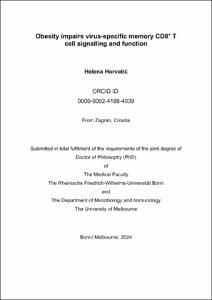Obesity impairs virus-specific memory CD8+ T cell signalling and function
Obesity impairs virus-specific memory CD8+ T cell signalling and function
| dc.contributor.advisor | Abdullah, Zeinab | |
| dc.contributor.author | Horvatić, Helena | |
| dc.date.accessioned | 2024-04-11T10:35:00Z | |
| dc.date.issued | 11.04.2024 | |
| dc.identifier.uri | https://hdl.handle.net/20.500.11811/11488 | |
| dc.description.abstract | The main function of the immune system is to protect the host against invading pathogens. Immunological memory is formed after a primary infection and serves to provide protection in a fast and vigorous manner upon secondary encounter with the same pathogen. Under obesity conditions, however, protective immunity is impaired, constituting a significant risk factor for high incidence and severity of re-infections. Indeed, during the current COVID-19 pandemic, obesity has been recognized as a major risk factor for adverse clinical outcomes. Impaired immunity observed in obese individuals has been attributed to a dysfunction in CD8+ T cells, which are essential for the elimination and sterile clearance of viral infections. Yet, the underlying mechanisms of the immune-compromised status of obese individuals remain poorly understood.
Using mouse models of diet-induced obesity and lymphocytic choriomeningitis virus infection, we showed increased morbidity and mortality of obese mice after re-infection, recapitulating the clinical situation in humans. Obese mice failed to mount protective immunity and showed a profound loss of virus-specific memory CD8+ T cells in the spleen and liver. This phenotype was associated with a compromised proliferation capacity and reduced ability to produce the effector cytokines IFNg and TNFa. Furthermore, our data revealed a severe decline specifically within hepatic tissue-resident memory T cell pool, which positively correlated with the body weight and contributed to the severe symptoms observed in obese mice. Additionally, we observed enhanced accumulation of IgA+, IL-10 producing, and PD-L1+ B cells in the liver of obese mice, and their absence was associated with normal numbers of hepatic tissue-resident memory T cells. Notably, genetic ablation of IL-10 production by B cells did not reconstitute the memory response, indicating that IgA+ B cells do not exert a suppressive effect towards the virus-specific CD8+ T cells via IL-10. Furthermore, our findings show that the impaired memory response in obese mice is due to T-cell intrinsic mechanisms driven by long-term exposure of virus-specific memory CD8+ T cells to the inflammatory environment, rather than by affecting their development and recruitment. Molecular analysis revealed transcriptional reprogramming of memory CD8+ T cells under obesity conditions, resulting in impaired T-cell receptor signaling. The obesity-inflicted changes in memory CD8+ T cells were highlighted by the impairment of Ca2+ influx upon CD8+ T cell stimulation in vitro. Collectively, our findings indicate that virus-specific memory CD8+ T cells exposed to an obese environment lose their ability to confer protection. The future intention of this project is to identify key molecules within the Ca2+ signalling pathway that could be therapeutically modulated to improve the ability of virus-specific memory CD8+ T cells to provide protection and to improve the immune response of obese individuals to re-infections. | en |
| dc.language.iso | eng | |
| dc.rights | In Copyright | |
| dc.rights.uri | http://rightsstatements.org/vocab/InC/1.0/ | |
| dc.subject | Obesity | |
| dc.subject | CD8+ T cells | |
| dc.subject | Immunological memory | |
| dc.subject | Tissue-resident memory T cells | |
| dc.subject | IgA+ B cells | |
| dc.subject.ddc | 570 Biowissenschaften, Biologie | |
| dc.title | Obesity impairs virus-specific memory CD8+ T cell signalling and function | |
| dc.type | Dissertation oder Habilitation | |
| dc.publisher.name | Universitäts- und Landesbibliothek Bonn | |
| dc.publisher.location | Bonn | |
| dc.rights.accessRights | embargoedAccess | |
| dc.date.embargoEndDate | 15.04.2026 | |
| dc.identifier.urn | https://nbn-resolving.org/urn:nbn:de:hbz:5-75727 | |
| dc.relation.doi | https://doi.org/10.1016/j.jhep.2023.02.026 | |
| dc.relation.doi | https://doi.org/10.1016/j.jhep.2023.04.037 | |
| ulbbn.pubtype | Erstveröffentlichung | |
| ulbbnediss.affiliation.name | Rheinische Friedrich-Wilhelms-Universität Bonn | |
| ulbbnediss.affiliation.location | Bonn | |
| ulbbnediss.affiliation.otherLocation1 | Melbourne | |
| ulbbnediss.affiliation.otherName1 | University of Melbourne | |
| ulbbnediss.thesis.level | Dissertation | |
| ulbbnediss.dissID | 7572 | |
| ulbbnediss.date.accepted | 28.03.2024 | |
| ulbbnediss.institute | Medizinische Fakultät / Institute : Institut für Experimentelle Immunologie (IEI) | |
| ulbbnediss.fakultaet | Medizinische Fakultät | |
| dc.contributor.coReferee | Kallies, Axel | |
| ulbbnediss.contributor.orcid | https://orcid.org/0000-0002-4188-4039 |
Dateien zu dieser Ressource

Dieses Dokument ist zur Zeit gesperrt.
Das Dokument erscheint in:
-
E-Dissertationen (2047)



